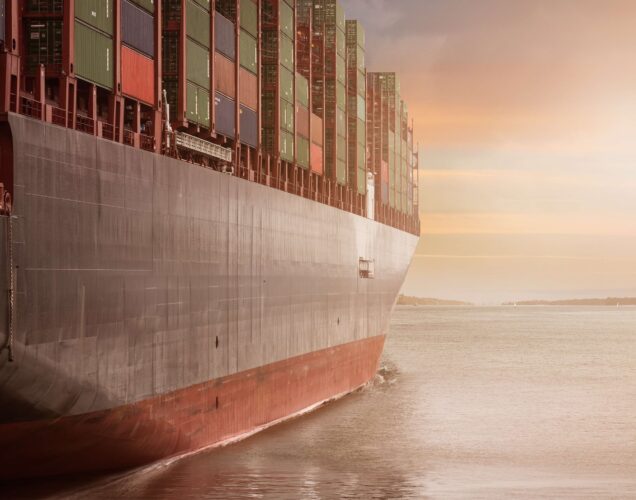Shipping your goods overseas for the first time can be scary – but it doesn’t need to be. This simple guide should ensure your first ever shipping experience is a breeze, not a burden.
Agree your Incoterms
Before selling or purchasing goods, it is imperative to agree a freight Incoterm as this will dictate which party pays for various parts of the journey. There are 11 different terms of shipment which are universally understood, so even if you don’t speak the same language as your customer or supplier, you will be able to establish a transaction.
Our guide to incoterms provides a glossary of the key terms, plus a diagram that outlines how payment is shared between buyer and seller under each term. Some terms put more responsibility on the seller, while others require the buyer to make the majority of payments, so it’s worth asking for further guidance from your freight forwarder. Once a freight term is agreed between parties, the shipping process can begin.
Choose a freight forwarder
A freight forwarder is a company that ships and receives cargo on a customer’s behalf. Freight forwarders effectively ‘bridge the gap’ between customers and the carriers who physically transport goods, such as shipping lines, airlines or road hauliers. They will liaise with these companies to ensure a customer’s cargo is delivered efficiently and safely, utilising their logistical expertise to establish the best mode of transport, while managing other processes such as customs clearance. Some forwarders also have their own fleet of HGVs to transport cargo to/from ports and airports.
When looking for a freight forwarder, make sure you check their website for ‘trust marks’ including awards and membership of trade associations such as BIFA, IATA, RHA, UKWA, AEO and ISO. In most cases, you will be able to cross-check this by visiting a trade association’s website and searching for the freight forwarder in its member database. It’s also worth taking a close look at the language, depth and quality of content across the site, plus any client case studies and testimonials.
However, it’s only by meeting a freight forwarder face-to-face that you’ll be able to establish whether you’d be happy to trust them with the transport of your goods, whether it’s containerised produce or heavy-duty cargo such as vehicles and machinery components. Ideally, you’ll want to work with a forwarder who treats you as a partner, fully understands your needs, and is happy to hold your hand through all of the various stages.
Check the weight and dimensions of your cargo
Knowing the precise size and weight of your cargo will allow your freight forwarder to provide you with an accurate cost and prevent any last-minute hitches that could affect your shipment. Cargo ships only have a finite amount of capacity, so freight is usually loaded into trailers or shipping containers to maximise the usable space.
If you don’t provide accurate measurements upfront, you freight forwarder will need to remeasure it, which could see the final price amended. Your forwarder may have also reserved container space, which will need to be readjusted, potentially impacting delivery time.
Prepare your packaging
Some freight forwarders will be able to pack cargo on your behalf, but others may ask that you take care of this yourself. It’s obviously in your interest – as well as the forwarder’s – to protect your cargo at all stages of the journey, so make sure you take extra care when packing your cargo.
While shipping containers should offer sufficient protection, remember that they will probably be exposed to the elements for an extended period of time – so extra protection may be needed if your cargo is to survive sub-zero temperatures, strong winds and extreme humidity.
Many countries now adhere to the ISPM15 International Standard of Wood Packing, so it essential to ensure any export pallets or crates that are being used comply, or cargo can be rejected or returned to origin. Further details can be found here.
Label everything
If there’s one thing that will guarantee a shipment going missing, it’s incorrect or non-existent labelling. The majority of freight forwarders will know how certain cargo should be labelled, and will happily take care of creating and attaching labels for you. However, there’s still an onus on you, the customer, to outline the precise nature of the cargo, and provide accurate address details to ensure the cargo arrives at the correct destination.
If you’re dealing directly with a shipping company, they should provide you with their preferred labelling standards, as well as any information on what types of item, e.g. organic cargo, needs to be declared. If you fail to declare items that require declaration, your shipment could delayed and subject to testing and quarantine.
Insure your shipment
Long-haul transportation isn’t always straightforward and can be affected by a number of variables, from poor weather and air traffic to road closures and broken down vehicles. To protect against unforeseen and unfortunate events such as this, it’s important to get your cargo insured ahead of shipment, ensuring you don’t lose out financially as a result.
As per any type of insurance, it pays to shop around for the best cargo insurance deal, taking note of reviews, the size of any excess, and what exactly the policy covers. Your freight forwarder may even be able to arrange this for you, or at least point you in the direction of a recommended insurer.
Complete all necessary documentation
If you’re looking to assign a large proportion of your shipping requirements to a freight forwarder, or require assistance with a project involving multiple shipments and logistical challenges, you’ll typically need to sign a contract that outlines the terms of service.
This won’t always be the case for single shipments; however, you’ll still be expected to complete a packing list, which outlines the contents, dimensions and weight of each package or container. A freight forwarder will also need copies of commercial invoices that provide evidence of the transaction between the shipper and end customer to allow the freight agent to complete customs formalities.
Certain countries require extra documentation such as Certificate of Origin (COO) or an EUR 1 certificate, so exporters are advised to ask the consignee about the document requirements for importation into the relevant country. Your freight forwarder should also be able to provide details of the rules that apply in each country, while providing any additional documents that are required. These can also be supplied by local chambers of commerce.
For added security, you may also wish to obtain a letter of credit from a bank. This will guarantee payment for your goods upon the completion of certain actions – for example, the provision of a commercial invoice or bill of lading, which guarantee the goods being delivered in a specific timeframe. If a buyer doesn’t make payment – and the terms of the letter of credit have been fulfilled – the bank will make payment on their behalf.
Most freight forwarders will complete a bill of lading as part of their service, but you’ll need to ensure you provide them with accurate information on the nature of the cargo, as well as its origin and destination, otherwise it could result in delayed shipment and payment.
Register for an EORI number
An EORI number is a legal requirement for UK companies that export outside of the EU or import from non-EU countries. However, once the UK leaves the EU, every company that trades into or out of the EU will need an EORI number. Without one, goods won’t be allowed through customs, potentially leading to delays and additional storage costs. You can apply for an EORI at https://www.gov.uk/eori, or read our guide to EORI registration for more detail.







